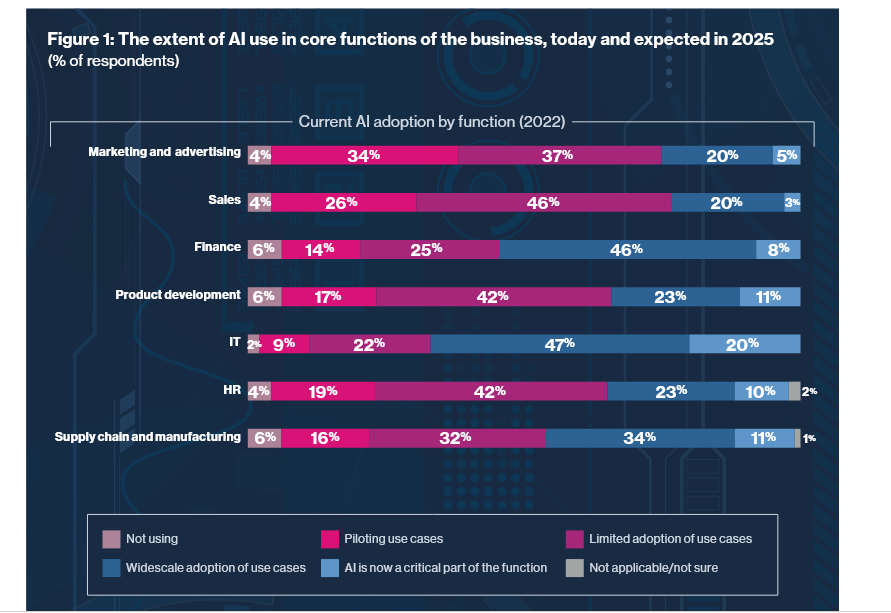Data management, powered by new-age BI and Machine Learning capabilities, has emerged as the most important factor in the successful adoption of AI platforms. A majority of the CIOs surveyed by MIT Technology Review Insights have stated AI and data management as the pillars of modern enterprise technology, with a large number of respondents actually citing enterprise data mismanagement as “a critical factor that could jeopardize their company’s future AI success.”
Recommended: Micron Advances OCP Storage Support for Cloud-Scale and Enterprise Data Centers
Decades of AI Work but Still Light Years Away from Mastering the Science in Business Scenarios
Businesses have invested in a considerable amount of AI and machine learning research programs. Yet, a large number of these organizations sill struggle to fully-utilize the true potential of AI capabilities in their business environment. The report, “CIO vision 2025: Bridging the gap between BI and AI,” was conducted in May and June 2022 in association with Databricks, pioneer of the lakehouse architecture. The report gathered insights and forecasts of the CIO of various challenges in data management in AI space. These CIOs state about the business value realization as they work to unleash the power of AI in their enterprises.
“These insights from global CIOs are consistent with what we hear in the field. AI-ready data is no longer a nice-to-have — it is critical to solve real-world problems and drive business outcomes,” says Chris D’Agostino, Global Field CTO at Databricks.
Chris added, “An open and unified platform like the Databricks Lakehouse enables organizations to put their data into action and we are committed to ongoing innovations that will empower business leaders to deploy and scale mission-critical AI projects successfully.”
Significant Growth in the Number of Use-cases Organizations are Developing for AI-led Operations
Almost 94% of those surveyed say they are already using AI in their line of business today. IT and Finance are top two core functions where the use of AI has made a great impact.
“AI leaders”, the modern legion of CIOs, have been entrusted to build a strong data management foundation for their AI-based systems for various business operations in the IT, Finance, HR, Product Development, Marketing and Sales and other important functions. These leaders see AI as the most critical factor for boosting their revenue generation by 2025. These would be supported by enhancing budgets for data security, compliance and governance, and multi-Cloud architecture for top industries Among the companies represented in this research are: Procter & Gamble, Johnson & Johnson, Cummins, CNH Industrial, Walgreens Boots Alliance, S&P Global, Marks & Spencer, Tokio Marine, Virgin Australia, and Freshworks.
Open Source ITechnology News: immudb First Immutable Open Source Database to be FedRAMP Compliant

Future of AI Linked to Data Management Policies
Companies continue to struggle with their existing data management systems that could support present day “AI-friendly” operations. Organizations could tap contemporary data warehousing and data integration solutions to tap the full potential of AI and machine learning capabilities. Data architecture, or the lack of it, is holding back CIOs from executing AI-based strategies in their organizations.
Companies, that are investing in BI and Machine Learning tools, are all doing it to fortify their core business values using data strategy. 72% of C-level respondents stress that problems with data management will jeopardize future AI achievement. Most leaders are keen to invest in unifying their data platform for analytics and AI in the next three years to bolster AI adoption. Yet, they know the biggest challenges in their execution.
Companies, that are investing in BI and Machine Learning tools, are all doing it to fortify their core business values using data strategy.
Over two-thirds of respondents (68%)—and nearly all leaders (99%)—say this is crucial to the success of their enterprise data strategy. 78% of surveyed executives say scaling AI successfully is top priority for data strategy. The surveyed companies’ data and AI strategies are closely interlinked. Over three-quarters (78%) of the executives surveyed say that scaling AI and machine learning use cases to create business value is the top priority for their enterprise data strategy over the next three years. For example, AI investment is one of the strongest in financial services. Companies that offer financial services are expected to see the highest investment growth in data management and infrastructure.
Multi-Cloud and Open Standards Key to AI Dominance
Open architecture in Multi-cloud environment could set the ball rolling faster for modern innovation companies that focus on AI, BI and Machine Learning solutions. Executives see multi-cloud and open standards as integral to AI progress where flexibility in the multi-cloud approach provides for wider range of AI development. CIOs interviewed for the study emphasize the importance of open architecture standards in supporting multi-cloud, and the importance of both in progressing AI development.
“Data issues are more likely than not to be the reason if companies fail to achieve their AI goals, according to more than two-thirds of the technology executives we surveyed,” says Francesca Fanshawe, editor of the report.
Fran added, “Improving processing speeds, governance, and quality of data, as well as its sufficiency for models, are the main data imperatives to ensure AI can be scaled.”
Conclusion
In the next 3 years, CIOs would increase their investments in talent and skills development, focusing on process re-engineering, data governance, AI open-source standardization, BI and machine learning infrastructure development and data unification. Investments in AI skills and talent base would remain the most instrumental factor in deciding the course of data management, BI and machine learning innovations in the next 2-3 years.
[To share your insights with us, please write to sghosh@martechseries.com]


